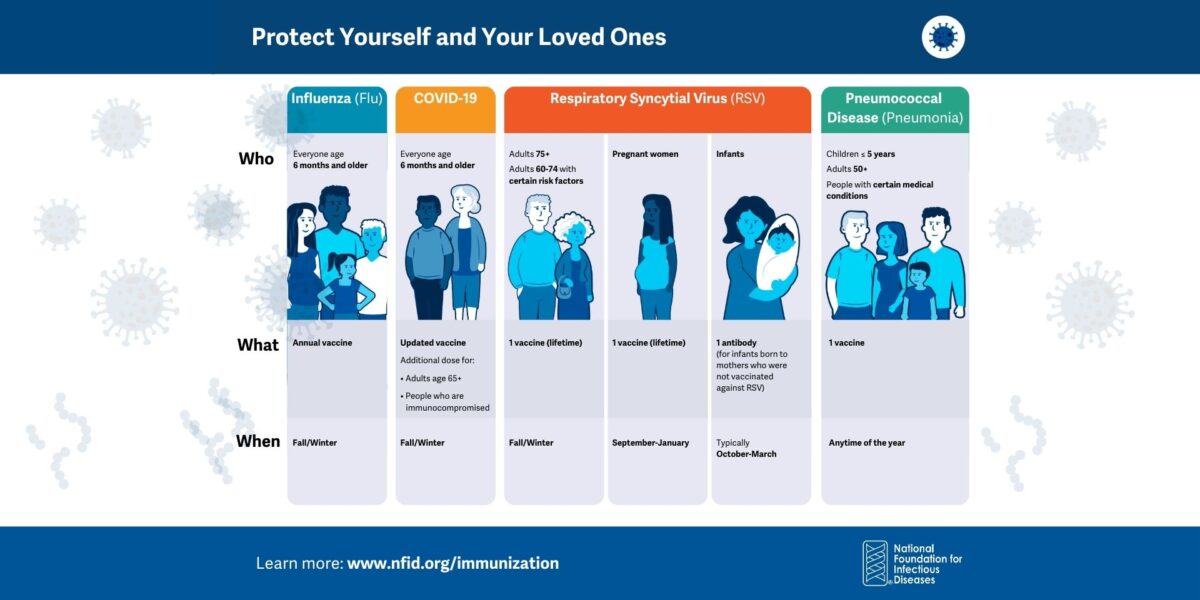
Influenza (flu) is a contagious viral infection that can cause mild to severe symptoms and life-threatening complications, including death, even in healthy children and adults. Pneumococcal disease is caused by bacteria and can cause various types of illness, including pneumonia, meningitis, ear and sinus infections, and sepsis.
Given that fewer than half of US adults typically receive an annual flu vaccine (despite the recommendation for everyone age 6 months and older to get vaccinated each year), the National Foundation for Infectious Diseases (NFID) commissioned a survey to better understand beliefs about flu and pneumococcal disease, as well as attitudes and practices around vaccination including the implications of the COVID-19 pandemic. The survey included 1,000 complete responses—897 via the web and 103 via telephone—with US adults age 18 years and older representing the 50 states and the District of Columbia.
Summary of Key Results
Attitudes and Practices around Flu Vaccination
Overall, most US adults believe vaccination is the best protection against flu, but many do not plan to get vaccinated during the 2020-2021 flu season
- 68 percent agree that flu vaccination is the best preventive measure against flu-related deaths and hospitalizations (up from 61 percent in 2019)
- Only 59 percent say they plan to get vaccinated against flu during the 2020-2021 flu season and 15 percent said they are not sure (a slight increase compared to 52 percent who planned to get a flu vaccine in 2019)
- Among those who are unsure or do not plan to get a flu vaccine, top reasons cited include:1
- 34 percent do not think flu vaccines work very well
- 32 percent said that they never get the flu
- 29 percent are concerned about potential side effects from the vaccine
- 22 percent are concerned about getting flu from the vaccine
- 17 percent are concerned about potential exposure to COVID-19 if they go out to get vaccinated
- Nearly one in four (22 percent) who are at higher risk2 for flu-related complications said they were not planning to get vaccinated this season
- Compared with the 2019 NFID survey, there is a significant decrease among those who say they will not get a flu vaccine because they believe it does not work (51 vs. 34 percent)
- Most White adults (59 percent) and Hispanic adults (65 percent) plan to get vaccinated against flu for the 2020-2021 season, but more than half of Black adults (62 percent) are not sure or do not plan to get vaccinated
Flu Vaccination and COVID-19
US adults are more likely to worry about getting COVID-19 than flu
- Nearly half (46 percent) are very or extremely worried about COVID-19 infection (for themselves or someone in their family), but only 23 percent are similarly concerned about being infected with flu
- Another 46 percent are worried about being infected with COVID-19 and flu at the same time
- Black (61 percent) and Hispanic adults (53 percent) are more likely to be worried about contracting both infections at the same time compared to White adults (39 percent)
- 28 percent say the COVID-19 pandemic makes them more likely to get vaccinated against flu during the 2020-2021 flu season
Sources of Information about Flu Vaccination
Healthcare professionals are the primary and most trusted source of information about flu and flu vaccination
- Most US adults get information about flu vaccines from a healthcare professional, with more than 60 percent indicating healthcare professionals as their primary source of information
- More than 80 percent of US adults trust healthcare professionals for flu vaccine information, far more than other sources3
Access to Flu Vaccination
Among those who have received a flu vaccine, the majority report receiving their last vaccination in a healthcare setting
- 25 percent say they would be more likely to be vaccinated during the 2020-2021 flu season if flu vaccines were offered in additional settings like drive-thru clinics, in addition to venues like doctor’s offices and pharmacies
- 64 percent report receiving their last flu vaccine in a healthcare setting (e.g., doctor’s office, pharmacy, hospital, health clinic/fair or health department)
Antiviral Medication to Mitigate Flu Symptoms
An overwhelming majority of US adults would take antiviral medication to mitigate severe flu symptoms if prescribed by a healthcare professional
- 77 percent of US adults would be willing to take an antiviral medication prescribed by a healthcare professional to help reduce severe flu symptoms
- Black adults are more likely (39 percent) to say that they will not take flu antivirals than White (22 percent) or Hispanic adults (17 percent)
Knowledge and Attitudes around Pneumococcal Disease
Among adults age 65 years and older, or those with an underlying health condition4 who are at higher risk for pneumococcal disease2, there are gaps in awareness and understanding about pneumococcal disease and vaccination
- 46 percent are not familiar with pneumococcal disease (unchanged from 2019 levels)
- More than half (51 percent) report that they have not been advised to get vaccinated against pneumococcal disease
- 65 percent report they are unsure of their vaccination status or have not received a pneumococcal vaccination
- Among those who have not been vaccinated against pneumococcal disease, 89 percent are either unsure or do not plan to get a vaccine
- Among those who are unsure or do not plan to get a pneumococcal vaccine, top reasons cited include:1
o 28 percent are concerned with side effects from the vaccine
o 15 percent are concerned about potential exposure to COVID-19 if they go out to get vaccinated
o 14 percent said they don’t think that pneumococcal vaccines work very well
o 11 percent don’t think that pneumonia is a serious illness
Survey Findings
These survey findings highlight the importance of addressing misconceptions about flu and pneumococcal vaccine safety and effectiveness especially in the context of the COVID-19 pandemic
- Unlike COVID-19, there are currently safe, effective vaccines available in the US to help prevent flu and pneumococcal disease5
- Now more than ever, during the COVID-19 pandemic, flu vaccination is critical not only to protect yourself, your loved ones, and your community (especially those who are most vulnerable like children, adults age 65+, and individuals with certain chronic health conditions), but also to reduce potential strain on the US healthcare system
- Even in cases when flu vaccination does not prevent infection completely, it can reduce the severity and duration of illness and prevent serious complications6
- For more than 50 years, hundreds of millions of individuals in the US have safely received seasonal flu vaccines7
The survey findings underscore the need to address health disparities and educate populations at increased risk, including older adults and individuals with chronic health conditions such as lung disease, heart disease, and diabetes who are at higher risk for complications from both flu and COVID-19.
About the Survey
This NFID-sponsored survey was conducted by NORC at the University of Chicago. Data were collected using the AmeriSpeak Omnibus®, a monthly multi-client survey using NORC’s probability-based panel designed to be representative of the US household population.
Interviews for this survey were conducted between August 17 and 19, 2020, with adults age 18 years and older representing the 50 states and the District of Columbia. Panel members were randomly drawn from AmeriSpeak, and 1,000 completed the survey—897 via the web and 103 via telephone. Interviews were conducted in English. The final stage completion rate is 16.0 percent, the weighted household panel response rate is 23.6 percent, and the weighted household panel retention rate is 84.8 percent, for a cumulative response rate of 3.2 percent. The overall margin of sampling error is +/- 4.4 percentage points at the 95 percent confidence level, including the design effect. The margin of sampling error may be higher for subgroups.
Once the sample has been selected and fielded, and all the study data have been collected and made final, a poststratification process is used to adjust for any survey nonresponse as well as any noncoverage or under and oversampling resulting from the study specific sample design. Poststratification variables included age, gender, census division, race/ethnicity, and education. Weighting variables were obtained from the 2020 Current Population Survey. The weighted data reflect the US population of adults age 18 years and older.
About the National Foundation for Infectious Diseases
Founded in 1973, the National Foundation for Infectious Diseases (NFID) is a non-profit 501(c)(3) organization dedicated to educating the public and healthcare professionals about the burden, causes, prevention, diagnosis, and treatment of infectious diseases across the lifespan.
For more information, visit www.nfid.org/flu and www.nfid.org/pneumococcal.
1Top responses reflect survey respondent answers when asked to select “all that apply.”
2People at higher risk for complications from the flu or pneumococcal disease as defined in the survey include those age 65 years and older, smokers, and those with diabetes, asthma, heart disease, or kidney disease.
3Responses reflect survey respondents ranking selections on scale of “trust a great deal/a lot,” “trust somewhat,” and “trust a little/not at all.” Healthcare professionals include doctors, nurses, pharmacists, and other health professionals.
4Underlying conditions are defined in the survey as smoking, diabetes, asthma, heart disease, or kidney disease.
5Centers for Disease Control and Prevention. Adults: Protect Yourself with Pneumococcal Vaccines. www.cdc.gov/features/adult-pneumococcal/. Accessed September 2020.
6Misconceptions about Seasonal Flu and Flu Vaccines | CDC. Centers for Disease Control and Prevention. www.cdc.gov/flu/prevent/misconceptions.htm. Accessed September 2020.
7Centers for Disease Control and Prevention. Flu Vaccine Safety Information: Q&A. www.cdc.gov/flu/prevent/general.htm. Accessed September 2020.
October 2020
Related Resources

Kaitlyn’s Story (Flu)
Kaitlyn was a student at the University of Florida in Gainesville when she nearly died from flu

Respiratory Immunization Graphics
Graphics and sample social posts to help raise awareness about preventing COVID-19, flu, RSV, and pneumococcal disease

What Is an Antiviral?
Overview of antivirals—what they are, how they work, and what diseases they help treat
